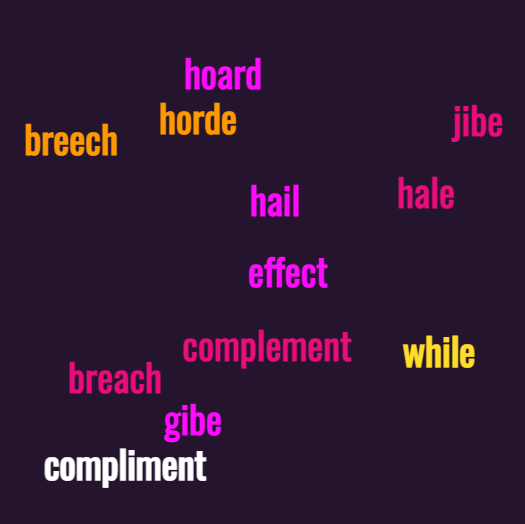
How many homophones can you spot in this beauty of a sentence (inspired by a perusal of a long list is homophones):
“Its a shame they can’t bye more knew close four there sun, butt their pour.“ (Ten.)
Most writers keep their eyes peeled for them, and copy editors and proofreaders pore over texts to find a swapped its or it’s; or a mistaken they’re, their, or their. Even the most experienced editor occasionally lets one slip when reading something especially engaging (thus the job of the proofreader for the final check).
In the Chicago Manual of Style‘s word usage section, I found a hundred words that piqued my interest. Here’s a peek at my favorite twelve:
Affect versus effect
Note: affect (v.) and effect (n.) are nearly pronounced the same, so I’ve included them in the list. Most commonly, the verb affect broadly means “to have an effect on.”
- Smoking two packs a day for years has affected his health.
- Why should I care? It doesn’t affect me.
- The economic effects of the embargo on Russian oil have been reduced by purchases from other authoritarian governments.
Awhile versus a while
Note: awhile (adv.) means “for a period of time.” A while (n.) means “a period of time.” Merriam-Webster notes that following a preposition with awhile is considered by many an error, but that it is increasingly common.
- Let’s stop awhile. OR: Let’s stop for a while.
- They rested awhile in the shade of an oak tree. OR: They rested for a while in the shade of an oak tree
- Kathy! It’s been a while! What have you been up to?
- Once in a while, I like to have a meal at a gourmet restaurant.
- It took awhile, but he finished his novel.
Breach versus breech
- He sued his employer for breach of contract.
- The enemy breached the outer defenses.
- Her baby was born breech.
- Make sure you hold the breech of the shotgun to your shoulder firmly.
Forgo versus forego
- We’re short of money, so we’ll have to forgo dinner and drinks out this weekend.
- It’s a foregone conclusion that public support for the measure will erode when it hits their pocketbook.
Gibe versus jibe
- Richard made a series of cruel gibes at Mike to goad him into a fight.
- In each of the conservative YouTuber’s episodes, he hurled gibes at liberal politicians.
- The rumor circulating on social media doesn’t jibe with my knowledge of fiscal policy.
Hail versus hale
- Before the tornado touched down, the sky went black, and it hailed the size of golf balls.
- “Hail to the Chief” has been the presidential anthem since 1954.
- Hail, Caesar!
- We hailed a taxi.
- Do you want me to try to hail that ship by radio?
- My grandfather’s a hale and hearty old man.
- At a hale 71, the bar owner still does Mick Jagger impersonations on stage.
Hoard versus horde
- Many people hoarded toilet paper during the pandemic.
- The dragon Smaug guarded a hoard of gold under the Lonely Mountain for 171 years.
- Hordes of Mongol horsemen led by the grandsons of Ghengis Khan invaded Europe in the 1220s.
- Venice is overcrowded with hordes of tourists every summer.
Metal versus mettle
- Metal tools and weapons were first used in the Bronze Age (3300 BC—1200 BC).
- I admire his mettle. He got up at 4 a.m. every day to study for his board exams, despite a grueling work schedule.
- “You are gentlemen of brave mettle.” (Shakespeare’s “The Tempest”)
Mete versus meet
- The IRS metes out huge fines to Americans with undeclared accounts or businesses abroad.
- The remaining K rations were meted out to the weary paratroopers.
- Why don’t we meet for drinks?
- I met my wife on the Amalfi Coast a few summers ago.
Principal versus principle
- The couple decided to pay down the principal on their loan.
- The school principal called a staff meeting.
- The principal ingredient in gazpacho is tomato.
- The principal reason for me to move abroad was to find a better quality of life.
- His principles prevented him from cutting corners.
- Fighting against the new CEO’s push to increase profits, the teacher took a principled stand in the staff meeting.
- In 1910, Bertrand Russel wrote a book about mathematical principles called Principia Mathematica.
Strait versus straight
- You can find yourself in dire straits if you try to swim the Strait of Gibraltar without proper training and an escort boat.
- Go straight, then turn right.
It takes mettle to study word usage awhile every day and keep these terms straight, but if you do, you’ll find enjoyment in knowing the tough ones. If you have any favorites—or can come up with entertaining sentences with these “confusables”—leave a comment.
Bonus homonyms (see introduction): pique/peak/peek, pore/pour/poor, peel/peal.
